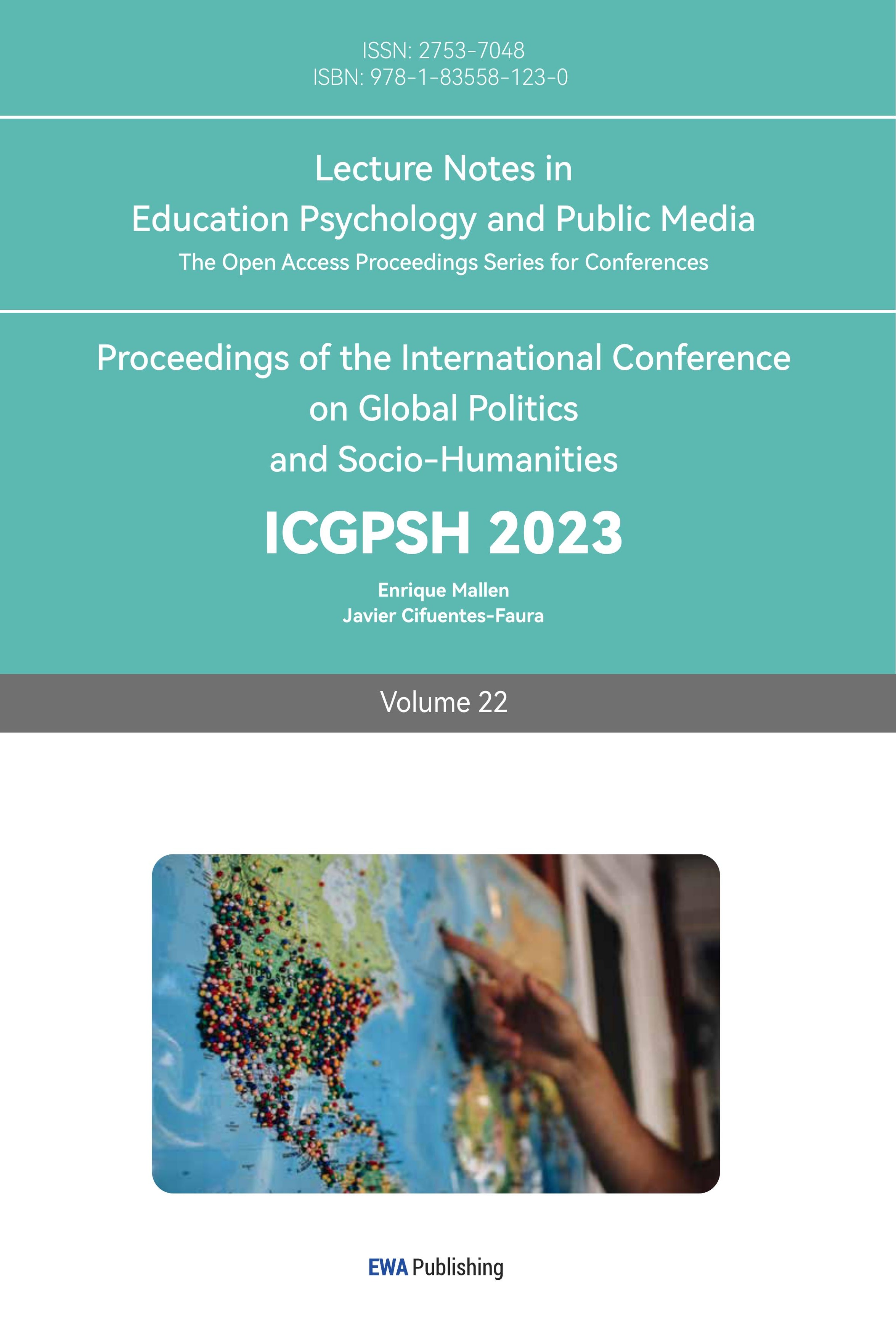References
[1]. Mohammed S H, Kinyó L. (2020) The role of constructivism in the enhancement of social studies education[J]. Journal of critical reviews 7(7): 249-256.
[2]. Driscoll, M. P. (2005). Psychology of learning for instruction.
[3]. Thompson, Penny. (2018). Foundations of educational technology.
[4]. Amineh, R. J., & Asl, H. D. (2015). Review of constructivism and social constructivism. Journal of Social Sciences, Literature, and Languages, 1(1), 9-16.
[5]. Jaleel, S., & Verghis, A. M. (2015). Knowledge creation in constructivist learning. Universal Journal of Educational Research, 3(1), 8-12.
[6]. Gomleksiz, M. N., & Elaldi, Ş. (2011). Yapılandırmacı Yaklaşım Bağlamında Yabancı Dil Öğretimi. Electronic Turkish Studies, 6(2).
[7]. Krahenbuhl, K. S. (2016). Student-centered education and constructivism: Challenges, concerns, and clarity for teachers. The Clearing House: A Journal of Educational Strategies, Issues, and Ideas, 89(3), 97-105.
[8]. Basturk, S. (2016). Primary Pre-Service Teachers’ Perspectives on Constructivism and Its Implementation in the Schools. Universal Journal of Educational Research, 4(4), 904-912.
[9]. Savery, J. R., & Duffy, T. M. (1995). Problem-based learning: An instructional model and its constructivist framework. Educational Technology, 35(5), 31-38.
[10]. Ah-Nam, L., & Osman, K. (2017). Developing 21st Century Skills through a Constructivist-Constructionist Learning Environment. K-12 STEM Education, 3(2), 205-216.
[11]. Gunduz, N., & Hursen, C. (2015). Constructivism in Teaching and Learning; Content Analysis Evaluation. Procedia-Social and Behavioral Sciences, 191, 526-533.
Cite this article
Chen,Q.;Cheng,X.;Jing,E. (2023). The Influence of Constructivist Learning Style on College Students' Learning of Basic Subjects. Lecture Notes in Education Psychology and Public Media,22,327-334.
Data availability
The datasets used and/or analyzed during the current study will be available from the authors upon reasonable request.
Disclaimer/Publisher's Note
The statements, opinions and data contained in all publications are solely those of the individual author(s) and contributor(s) and not of EWA Publishing and/or the editor(s). EWA Publishing and/or the editor(s) disclaim responsibility for any injury to people or property resulting from any ideas, methods, instructions or products referred to in the content.
About volume
Volume title: Proceedings of the International Conference on Global Politics and Socio-Humanities
© 2024 by the author(s). Licensee EWA Publishing, Oxford, UK. This article is an open access article distributed under the terms and
conditions of the Creative Commons Attribution (CC BY) license. Authors who
publish this series agree to the following terms:
1. Authors retain copyright and grant the series right of first publication with the work simultaneously licensed under a Creative Commons
Attribution License that allows others to share the work with an acknowledgment of the work's authorship and initial publication in this
series.
2. Authors are able to enter into separate, additional contractual arrangements for the non-exclusive distribution of the series's published
version of the work (e.g., post it to an institutional repository or publish it in a book), with an acknowledgment of its initial
publication in this series.
3. Authors are permitted and encouraged to post their work online (e.g., in institutional repositories or on their website) prior to and
during the submission process, as it can lead to productive exchanges, as well as earlier and greater citation of published work (See
Open access policy for details).
References
[1]. Mohammed S H, Kinyó L. (2020) The role of constructivism in the enhancement of social studies education[J]. Journal of critical reviews 7(7): 249-256.
[2]. Driscoll, M. P. (2005). Psychology of learning for instruction.
[3]. Thompson, Penny. (2018). Foundations of educational technology.
[4]. Amineh, R. J., & Asl, H. D. (2015). Review of constructivism and social constructivism. Journal of Social Sciences, Literature, and Languages, 1(1), 9-16.
[5]. Jaleel, S., & Verghis, A. M. (2015). Knowledge creation in constructivist learning. Universal Journal of Educational Research, 3(1), 8-12.
[6]. Gomleksiz, M. N., & Elaldi, Ş. (2011). Yapılandırmacı Yaklaşım Bağlamında Yabancı Dil Öğretimi. Electronic Turkish Studies, 6(2).
[7]. Krahenbuhl, K. S. (2016). Student-centered education and constructivism: Challenges, concerns, and clarity for teachers. The Clearing House: A Journal of Educational Strategies, Issues, and Ideas, 89(3), 97-105.
[8]. Basturk, S. (2016). Primary Pre-Service Teachers’ Perspectives on Constructivism and Its Implementation in the Schools. Universal Journal of Educational Research, 4(4), 904-912.
[9]. Savery, J. R., & Duffy, T. M. (1995). Problem-based learning: An instructional model and its constructivist framework. Educational Technology, 35(5), 31-38.
[10]. Ah-Nam, L., & Osman, K. (2017). Developing 21st Century Skills through a Constructivist-Constructionist Learning Environment. K-12 STEM Education, 3(2), 205-216.
[11]. Gunduz, N., & Hursen, C. (2015). Constructivism in Teaching and Learning; Content Analysis Evaluation. Procedia-Social and Behavioral Sciences, 191, 526-533.









